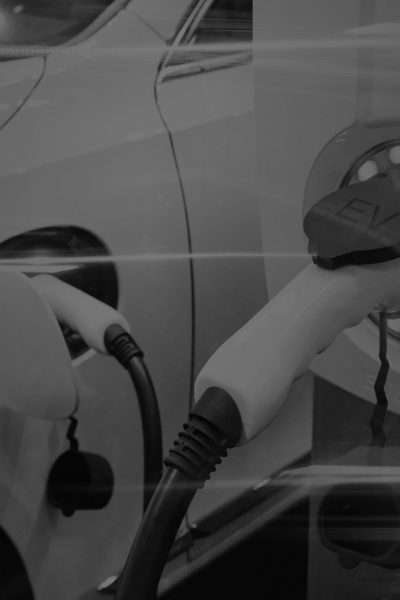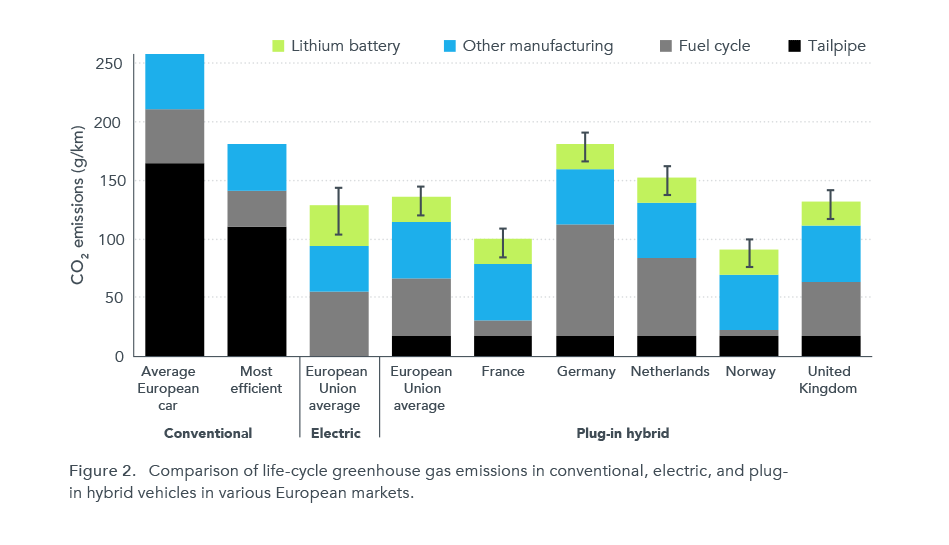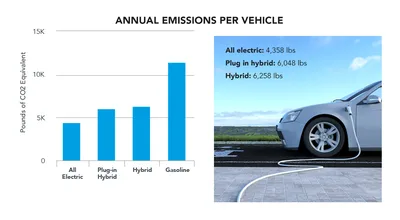
Electric and hybrid
- Share via X
- Share via Facebook
- Share via Pinterest
- Share via LinkedIn
-
Copy to your clipboard
Keeping on top of your EV or Hybrid
An electric vehicle (EV) has fewer moving parts than a conventional car. This means little servicing and no expensive fuel injection systems, radiators, exhaust systems, starter motors and many other parts that aren’t featured in an EV. Brakes, tyres and suspension are the key areas of maintenance.
Routine maintenance and minor repairs tend to be no higher for a hybrid than on a regular petrol/diesel car. In fact, costs for hybrid maintenance may be lower. The combustion engine shuts down when the car is idle and at low speeds when the electric motor takes over. That means there's less wear and tear on the engine. However, the hybrid systems can be complex and if repairs are required outside of the manufacturer warranty period then the costs can be much higher.
go green
Over
a year, just one electric car on the road can save an average 1.5
million grams of CO2. That’s the equivalent of four return flights from
London to Barcelona.


Source: EDF Energy
Do electric cars require specialist tyres?
Electric and hybrid vehicles pose a new challenge for tyre manufacturers. High torque and increased weight compared to conventional cars can increase standard tyre wear on electric vehicles by around +30%. With a drastic reduction in noise as a result of removing the traditional combustion engine, tyres must also contribute to lowering the overall cabin noise by reducing rolling resistance. Despite battery technology improving exponentially in recent years, limited battery range also prompts increased demand for tyres with lower rolling resistance to help improve overall vehicle efficiency.
To address these challenges premium manufacturers such as Goodyear have worked closely with a number of the worlds leading electric vehicle manufacturers such as Tesla and Porsche to develop an original equipment specification tyre that balances longevity with outright performance and efficiency. In fact, the technology has been so well received that leading patterns such as the Goodyear EfficientGrip Performance 2 are now electric compatible as standard.
looking for some juice?
15,116 public charging devices as of October 2019.
London and the South East have the most charging stations:
London 4,360
South East 1,966
East Sussex has the fewest charging points with just 59.
To view charging devices by local authority: http://maps.dft.gov.uk/ev-charging-map/
Electric Car FAQs
There are several benefits to electric vehicles (EVs) versus conventional combustion engine petrol/diesel cars:
- Lower running costs - The electricity required to charge electric vehicles is considerably cheaper (pence per mile) than petrol for the same vehicle. To explore the cost savings why not try this handy fuel cost savings calculator.
- Reduced maintenance – An electric vehicle (EV) has fewer moving parts than a conventional car. This means little servicing and no expensive fuel injection systems, radiators, exhaust systems, starter motors and many other parts that aren’t featured in an EV. Brakes, tyres and suspension are the key areas of maintenance.
- Tax savings – Electric vehicles with a list price below £40,000 are exempt from road tax. For company car drivers with a zero-emission electric vehicle there is no benefit in kind tax which means 0% tax for 2020/21.
- Better for the environment - Electric vehicles emit zero emissions helping to reduce harmful air pollution from exhaust gases.
The electricity required to charge electric vehicles is considerably cheaper (pence per mile) than petrol and diesel alternatives. You can explore the potential savings using this handy Fuel Cost Savings Calculator.
Electric vehicles emit zero emissions helping to reduce harmful air pollution from exhaust gases. Using renewable energy to recharge EVs, can also reduce greenhouse gas emissions even further. Recharging EVs from a solar power system or other renewable energy sources can reduce environmental impact further.
An increasing trend towards eco-friendly production methods and materials for EVs such as recycled plastics reduces the impact on the environment throughout the production supply chain.
Electric motors are also much quieter than standard combustion engines, which means less noise pollution.
Batteries do wear out over time so replacement batteries will eventually be needed. Most car manufacturer warranties cover EV batteries for around 8 years and/or 100,000 miles. This warranty period is longer than most new car ownership with many drivers now opting for short leasing or PCH contracts.
The costs of replacing an electric car battery can run into thousands of pounds if they are no longer covered under the manufacturer’s warranty period. However, most EV manufacturers offer extensive warranty periods to give drivers peace of mind.
Much in the same way as a standard petrol/diesel car your driver display will show an estimated range and most EVs have a navigation system that will show your nearest charger. If drivers continue to drive beyond “- - -“miles the power will eventually enter a limp mode allowing you to position the vehicle more safely before coming to a complete stop in a similar way to many modern petrol/diesel cars. From here drivers will need to request roadside assistance.
- Charging requirements - Recharging batteries for EVs takes considerably longer than refilling a petrol/diesel car. EVs also rely on a healthy network of charging stations and drivers must plan journeys around this network.
- Limited range – EV vehicles are still in their infancy of development and current mileage range can vary between manufacturers.
- List prices - Electric cars remain generally more expensive than their petrol/diesel alternatives. However, government incentives aim to reduce the total cost of ownership by reducing/eliminating some taxes.
- Weight - Batteries make EVs considerably heavier than petrol/diesel cars. This a disadvantage because this weight puts pressure on battery usage and reduces tyre life.
Electric cars do not have combustion engines and instead use a motor. This means that they do not require engine oil, spark plugs, air filters, coolant, or transmission fluid.
The time it takes to charge an EV can be as little as 30 minutes for a ‘fast charge’ however, this can vary between manufacturers and models. Many EV drivers will top up charge rather than charging from empty to full. To check your vehicles charging time check out Pod Points handy guides.
An electric car should be serviced at the same intervals as any car however, EVs are considerably cheaper to service because they have fewer parts. Things such as new tyres, windscreen wiper replacement and brake fluid changes will all still be needed.
Your EV should be serviced by a certified technician who is able shut down and isolate high voltage systems safely.
Hybrid Cars FAQs
Much like electric vehicles hybrid cars tend to have extensive manufacturer warranty periods that are longer than modern ownership length due to increases in PCH and leasing contracts. For example, the Toyota Prius comes with an eight-year or 100,000-mile warranty as standard to offer peace of mind for drivers.
Routine maintenance and minor repairs tend to be no higher for a hybrid than on a regular petrol/diesel car. In fact, costs for hybrid maintenance may be lower. The combustion engine shuts down when the car is idle and at low speeds when the electric motor takes over. That means there's less wear and tear on the engine. However, the hybrid systems can be complex and if repairs are required outside of the manufacturer warranty period then the costs can be much higher.
This depends entirely on which battery has no power. If the standard 12-volt battery has no power, but the high-voltage battery is functioning; then you can drive the car. However, if the high-voltage battery has zero power, then you will be unable to drive the vehicle.
Hybrid cars still require engine oil just like any regular petrol/diesel car with an internal combustion engine. As hybrid cars use a combustion engine, this makes their lubrication needs just as crucial. However, oil changes may be required less frequently than a standard petrol/diesel vehicle.
Standard hybrids vehicles do not need to be plugged in. A standard hybrid uses both a combustion engine and an electric motor to increase mileage and lower fuel usage. The car is able to recharge its batteries using regenerative braking or while driving on engine power.
To increase electric motor mileage, some manufacturers are creating ‘plug-in hybrids’ that have more powerful batteries which can be charged by “plugging in” the vehicle to a sufficient power supply.
- Battery Issues - the common problem with hybrid cars is the battery technology. When the batteries can no longer hold a charge, they'll need to be replaced which can be very expensive if required outside of the manufacturer’s warranty period.
- Specialist technicians required - Taking your hybrid to a local garage may not always be possible. The complex hybrid systems often require a specialist technician with the correct training and qualifications required to work on hybrid vehicles.
